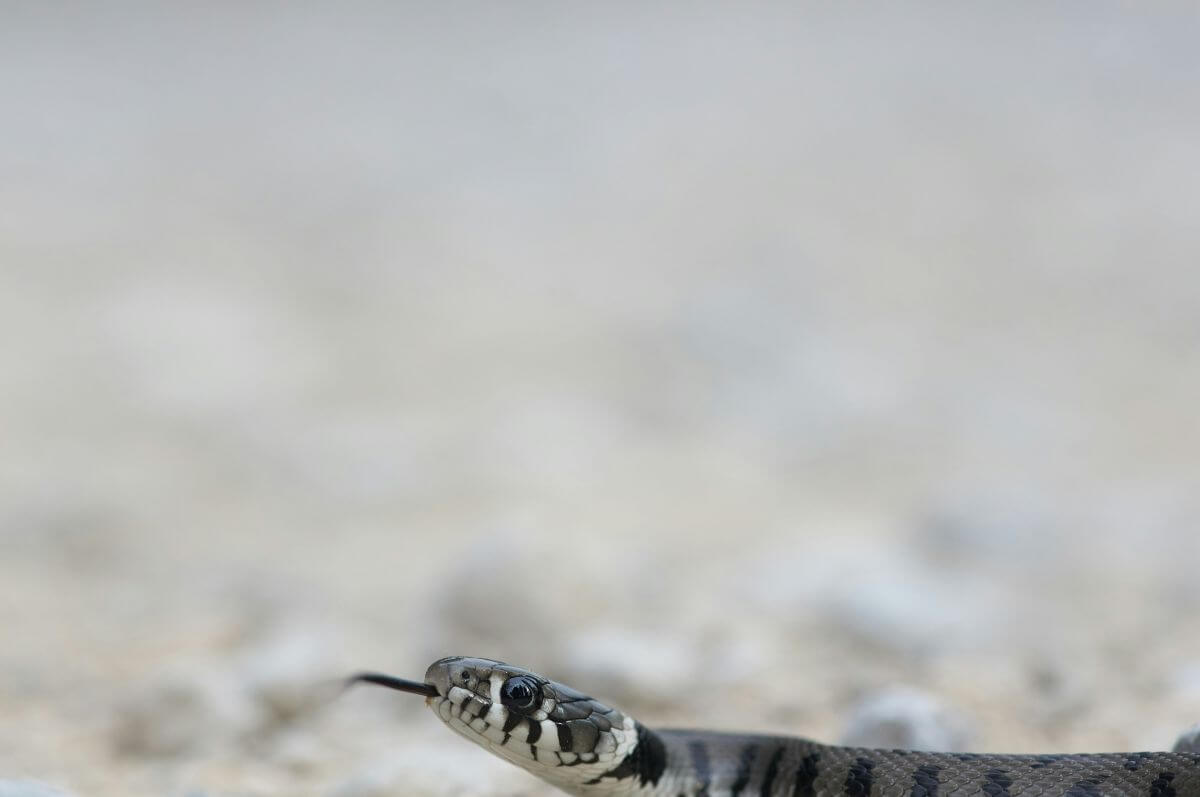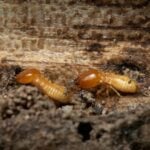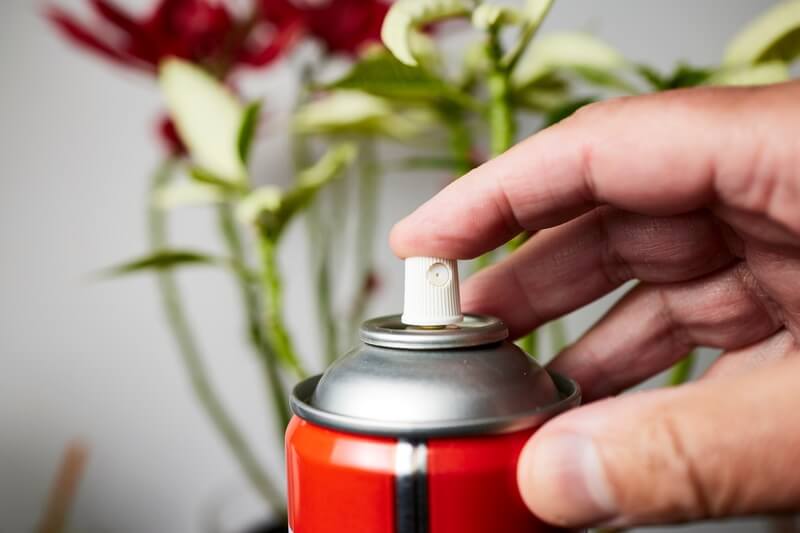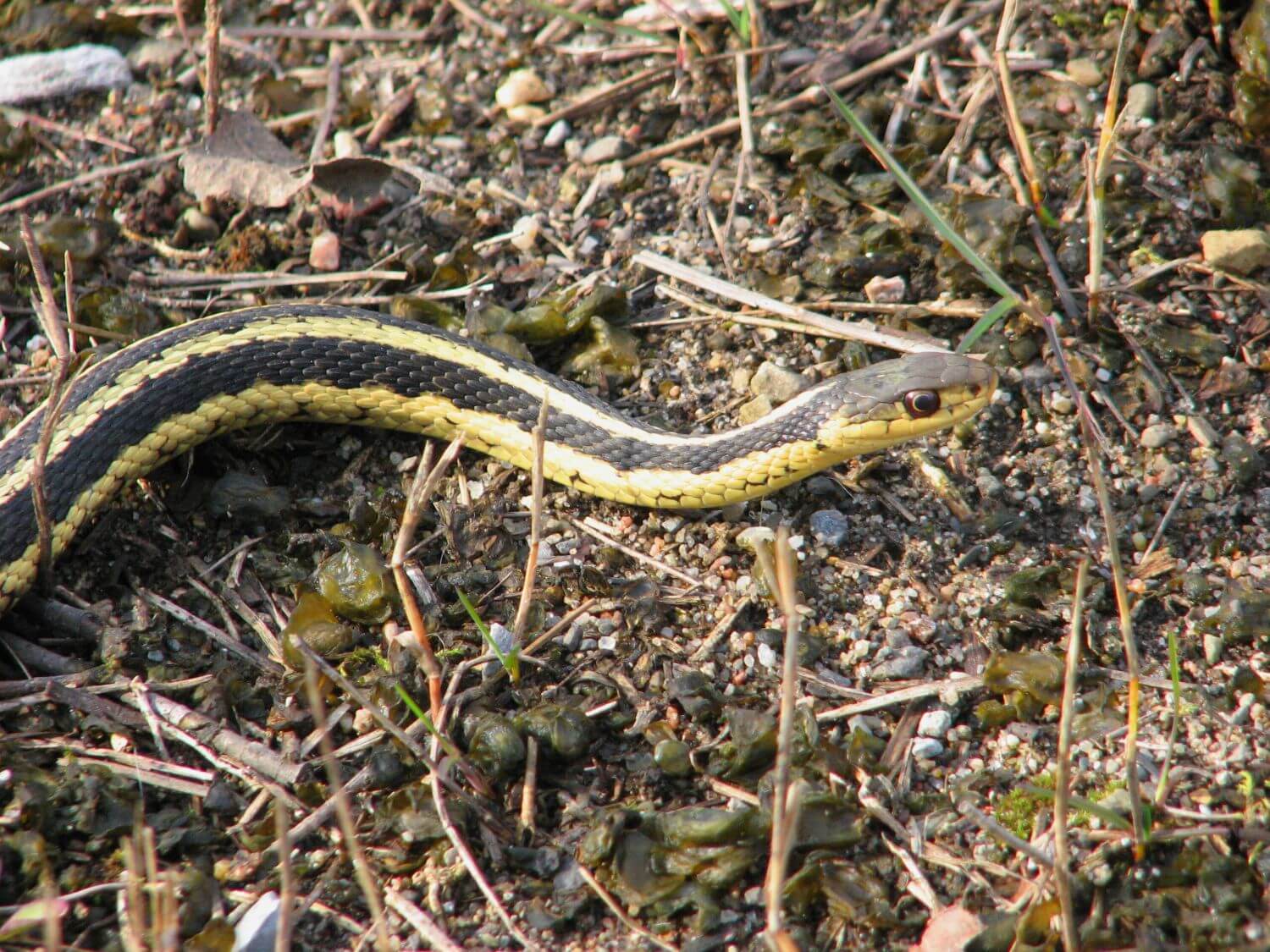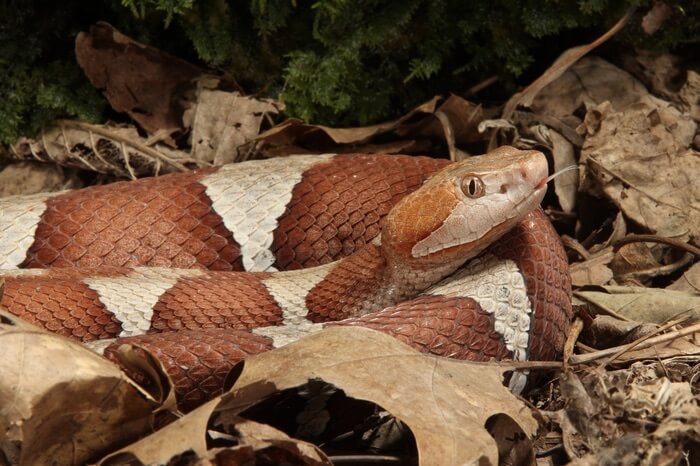Nobody wants to find a snake in their yard. The good news is that snakes have a very strong sense of smell, and there are certain scents they really don’t like.
Snakes use something called the Jacobson’s organ to smell. When they flick their tongues, they’re collecting scent particles from the air. Strong or unpleasant smells can overwhelm this system and make them want to leave.
Keep in mind that no smell will keep snakes away 100% of the time. These scents work best when combined with other prevention methods like keeping your yard clean. If you find a venomous snake, always call a professional.
Let’s look at the smells that snakes hate most, starting with the ones that have the strongest scientific backing.
1. Peppermint Oil
- Plant-based peppermint oil formula repels pests naturally
- Safe to use around pets, kids, and indoor living spaces
- Great for garages, attics, baseboards, and outdoor areas
- Fresh mint scent with long-lasting protection
Peppermint oil is a popular natural pest control option that many people use for everything from mice to spiders. While the scientific evidence for snake repelling isn’t as strong as cinnamon or clove oil, many homeowners report good results.
How it works: The strong minty smell can overwhelm a snake’s scent receptors and make navigation difficult. Some experts think the menthol in peppermint oil irritates snakes’ sensitive skin.
How to use it: Mix 15-20 drops of peppermint essential oil with one cup of water in a spray bottle. Shake well and spray around your property’s perimeter. You can also soak cotton balls in peppermint oil and place them in areas where snakes might hide.
Concentration matters: For outdoor use, you can make a stronger mixture with about 40-50 drops of oil per two ounces of water. The stronger the scent, the better it may work.
Bonus benefits: Peppermint oil also repels rodents, which means fewer food sources for snakes. Plus, it smells much more pleasant to humans than some other repellents.
Cost consideration: Pure peppermint essential oil can be expensive, but a little goes a long way. Look for sales at health stores or buy in bulk online.
2. Cinnamon Oil
When it comes to snake repellents, cinnamon oil is the gold standard. The U.S. Department of Agriculture has actually studied this spice and found that it really works. In fact, cinnamon oil is one of only three scents officially recommended by the government for keeping snakes away.
How it works: The strong smell of cinnamon oil messes with a snake’s ability to navigate and hunt. When they encounter this scent, it overwhelms their Jacobson’s organ and makes them uncomfortable enough to leave the area.
How to use it: The most effective way is to spray it directly on snakes, but most people prefer to spray it around their property instead. Mix one part cinnamon oil with one part liquid soap and 98 parts water. Spray this mixture around entry points, under decks, and anywhere you’ve seen snake activity.
Safety notes: Cinnamon oil is generally safe around pets and children when used properly. However, pure essential oils can be strong, so always dilute them before use.
Reapplication: You’ll need to reapply every 2-3 days or after it rains, since the scent fades over time.
This is definitely a smell that snakes hate, and the science backs it up. You can find cinnamon essential oil at most health stores or online.
3. Clove Oil
Clove oil is another government-approved snake repellent that packs a serious punch. Like cinnamon oil, it’s been tested by researchers and proven to make snakes retreat.
How it works: Clove oil contains a compound called eugenol, which snakes find very unpleasant. The smell is so strong that it can actually be used to fumigate enclosed spaces and drive snakes out of hiding.
How to use it: Mix one tablespoon of clove oil with two cups of water in a spray bottle. Shake well before each use and spray around your property’s perimeter. For enclosed spaces like sheds or crawl spaces, you can soak cotton balls in clove oil and place them strategically.
Safety warnings: Clove oil is used as a fish anesthetic, so never spray it directly into ponds, streams, or other water sources where fish live.
Pro tip: Many people mix clove oil with cinnamon oil for an extra-strong repellent that combines two proven ingredients.
You can buy clove essential oil at most stores that sell natural health products. A little goes a long way, so one bottle should last quite a while.
4. Eugenol
Eugenol is the active ingredient in clove oil, and it’s the third scent that the government recommends for snake control. Professional pest control companies sometimes use pure eugenol for serious snake problems.
How it works: This compound has an extremely strong smell that snakes can’t tolerate. It’s so effective that wildlife experts use it to remove snakes from cargo containers and other tight spaces.
How to use it: For home use, you’re better off sticking with clove oil, which naturally contains eugenol. If you do buy pure eugenol, make sure it’s at least 95% pure for the best results. Always dilute it heavily before use.
Safety protocols: Never heat eugenol with open flames. If you’re using it for fumigation, use heated air that’s no hotter than 200 degrees Fahrenheit.
Pure eugenol is harder to find than clove oil and more expensive. Unless you have a serious snake problem, clove oil will work just as well for most homeowners.
5. White Vinegar
Most people already have white vinegar in their kitchen, making it one of the easiest snake repellents to try. While it doesn’t have as much scientific backing as the essential oils above, many homeowners swear by its effectiveness.
How it works: The strong acidic smell of vinegar can disrupt a snake’s navigation system. The scent is so powerful that it overwhelms their sensitive smell receptors and encourages them to find somewhere else to go.
How to use it: You can spray undiluted white vinegar directly around areas where snakes might enter your property. It works especially well around pools, ponds, and other water features where snakes come to drink. For a milder approach, mix equal parts vinegar and water.
Plant safety warning: Straight vinegar can damage or kill plants, so be careful where you spray it. Avoid getting it on grass, flowers, or garden vegetables.
Reapplication: Vinegar evaporates fairly quickly, especially in hot weather. You’ll probably need to reapply every few days to keep the scent strong enough to work.
White vinegar is cheap and easy to find, making it a popular choice for people who want to try natural snake control without spending much money.
6. Garlic and Onions
These kitchen staples contain natural compounds that snakes find very unpleasant. Garlic and onions both have sulfonic acid, which creates a smell that snakes hate and helps keep them away from your property.
How it works: The sulfur compounds in garlic and onions irritate snakes and make your yard less appealing to them. As a bonus, these same compounds also kill insects, which removes some of the snakes’ food sources.
How to use it: Chop up fresh garlic cloves and onions, then mix them with rock salt. Sprinkle this mixture around your yard, focusing on entry points and areas where you’ve seen snake activity. You can also plant garlic and onions in your garden as a natural barrier.
Essential oil option: If you don’t want to deal with chopping vegetables, you can buy garlic essential oil and mix it with water for spraying.
Storage tips: Fresh garlic and onion mixtures will start to smell pretty bad after a few days, so make small batches and replace them regularly.
This is definitely a smell that snakes hate, and it has the added benefit of keeping other pests away too. Plus, you can use any leftover garlic and onions for cooking!
7. Ammonia
Ammonia has a reputation as a strong snake repellent, and there’s some truth to that. However, it comes with serious safety concerns that make it a risky choice for most homeowners.
How it works: The harsh chemical smell of ammonia is so strong that it can overwhelm a snake’s sensitive smell system. It may also irritate their skin and breathing passages, making them want to leave the area quickly.
How to use it (carefully): If you decide to try ammonia, soak old rags in it and place them in unsealed plastic bags around areas where snakes are a problem. Never leave ammonia-soaked materials where children or pets can reach them.
Serious safety warnings: Ammonia is toxic to humans and animals. Breathing ammonia fumes can cause serious health problems, especially for people with asthma or other breathing issues. It can also burn skin and eyes.
Better alternatives: Given the safety risks, most experts recommend trying other options first. The essential oils mentioned earlier are much safer and often just as effective.
If you have children, pets, or anyone with breathing problems in your home, skip ammonia entirely and choose a safer alternative.
8. Cedar Oil and Chips
Cedar has been used for pest control for centuries, and many people believe it helps keep snakes away too. You can use either cedar essential oil or physical cedar chips for this method.
How it works: Cedar contains natural compounds that many animals find unpleasant. The woody scent may disrupt a snake’s ability to detect prey or navigate effectively.
How to use cedar oil: Mix one tablespoon of cedarwood essential oil with two cups of water and spray around your property. Focus on potential entry points and areas where snakes might hide.
How to use cedar chips: Spread cedar chips or sawdust around your yard’s perimeter. This creates both a scent barrier and a physical texture that snakes may not like to crawl over.
Longevity: Cedar chips last longer than sprays, but you’ll need to replace them every few months as they lose their scent. The oil sprays need reapplication every few days.
Cost effectiveness: For large properties, cedar chips might be more affordable than essential oil. You can often buy cedar mulch or chips at garden centers.
Cedar is one of the smells that snakes hate, though it may not be as effective as the government-approved essential oils mentioned earlier.
9. Sulfur
Sulfur has been used as a snake repellent for many years, and you’ll find it in lots of commercial snake-away products. However, modern research suggests it might not work as well as people once thought.
Limited scientific backing: Despite its popularity, there’s actually very little scientific evidence that sulfur effectively repels snakes. Some studies have shown that snakes will crawl right over sulfur without any problem.
How it supposedly works: The theory is that sulfur irritates snakes’ skin and creates an unpleasant smell that makes them avoid treated areas.
How to use it: Powdered sulfur is sprinkled around the perimeter of your property. Some people mix it with other repellents for a combination approach.
Safety equipment needed: Sulfur powder can irritate your nose, throat, and lungs, so wear a mask when applying it. It can also affect soil pH levels over time.
Why experts recommend alternatives: Given the limited evidence and potential environmental effects, most wildlife experts suggest trying proven options like cinnamon or clove oil first.
If you want to try sulfur, look for it at garden centers. However, your money might be better spent on repellents with stronger scientific backing.
10. Citrus Scents
Citrus peels and essential oils are popular natural pest control options, though the evidence for snake repelling is mostly based on personal experiences rather than scientific studies.
Types to try: Lemon, lime, and orange peels all contain strong-smelling oils. Kaffir lime is particularly potent and may be more effective than common citrus fruits.
How to use peels: Scatter fresh citrus peels around your yard, focusing on entry points and snake hiding spots. You’ll need to replace them every few days as they dry out and lose their scent.
Essential oil method: Boil citrus peels in water for 15-20 minutes, let the mixture cool, then put it in a spray bottle. This creates a natural citrus spray that you can apply around your property.
Maintenance requirements: Fresh peels work better than dried ones, so this method requires regular upkeep. The oils in the peels are what create the scent, and these fade quickly once exposed to air.
Environmental benefits: Unlike chemical repellents, citrus peels are completely biodegradable and can be composted when you’re done with them.
While citrus might be a smell that snakes hate, the evidence is weaker than for other options on this list.
11. Coffee Grounds
Used coffee grounds are a popular suggestion for natural pest control, including snake deterring. While the scientific evidence is limited, the theory behind why they might work makes some sense.
How it might work: Coffee grounds have a strong smell that could overwhelm a snake’s scent receptors. They also have a rough, gritty texture that snakes might find uncomfortable to crawl over.
Secondary benefits: Coffee grounds are toxic to many insects and may help control rodent populations. Since these are food sources for snakes, reducing them could make your property less attractive to snakes overall.
How to use them: Sprinkle used coffee grounds around your yard’s perimeter and in garden beds. You can get free grounds from most coffee shops, or save your own if you brew coffee at home.
Collection tips: Many coffee shops are happy to give away used grounds since it reduces their waste. Call ahead to see if they’ll save some for you.
Pet safety warning: Coffee grounds contain caffeine, which is toxic to dogs and cats if eaten in large amounts. If you have pets, use this method carefully or choose something else.
Realistic expectations: While coffee grounds are free and environmentally friendly, they’re probably not as effective as proven essential oils for snake control.
12. Naphthalene and Mothballs
Mothballs are probably the most well-known home remedy for snake control, but they’re also one of the most problematic. While some studies show limited effectiveness, the health and safety risks make them a poor choice for most situations.
Limited effectiveness: Research from the University of Nebraska found that mothballs performed no better than doing nothing at all when it came to keeping snakes away. Other studies have found snakes curled up directly on top of treated areas.
Serious health risks: Mothballs contain chemicals called naphthalene or paradichlorobenzene, which are known carcinogens. These chemicals can cause headaches, dizziness, and breathing problems. They’re especially dangerous for children, who might mistake them for candy.
Legal issues: Using mothballs outdoors violates EPA regulations and the product label instructions. They’re only approved for use in sealed containers to protect clothing from moths.
Why experts advise against them: The combination of limited effectiveness and serious health risks makes mothballs a poor choice for snake control. There are much safer alternatives that work better.
Environmental concerns: Mothball chemicals can contaminate soil and groundwater, creating long-term environmental problems.
If you’re considering mothballs, please choose a safer alternative instead. The risks simply aren’t worth the minimal potential benefits.
What Doesn’t Work: Debunking Common Myths
Not every suggested snake repellent actually works. Here are some popular methods that sound good but don’t have scientific backing:
Lime: Despite being mentioned in many online articles, lime is not effective for snake control and can actually be dangerous. When wet, lime becomes caustic and can cause severe burns to skin. It also doesn’t contain the specific compounds that snakes find unpleasant.
Pine-Sol: There’s no scientific evidence that this household cleaner repels snakes. The pine scent might smell strong to humans, but it doesn’t seem to bother snakes.
Hair ropes: The old cowboy tale about sleeping inside a circle of rope to keep rattlesnakes away is just a myth. Snakes have no problem crossing ropes, hair, or similar barriers.
Ultrasonic devices: Electronic devices that claim to repel snakes with sound waves don’t work. Studies have shown that these devices have no measurable effect on snake behavior.
Irish Spring soap: Research has specifically tested this popular suggestion and found that snakes show no aversion to the soap.
When looking for information about smells that snakes hate, be careful about sources that don’t cite scientific studies. There are lots of myths and unproven methods circulating online.
Application Best Practices
Getting the most out of natural snake repellents requires proper application and realistic expectations. Here’s how to use these scents effectively:
Strategic placement: Focus on areas where snakes are most likely to enter your property. This includes gaps under decks, holes in foundations, areas around water features, and spaces near woodpiles or thick vegetation.
Weather considerations: Rain washes away most scent-based repellents, so you’ll need to reapply after storms. Hot, sunny weather also breaks down essential oils faster, requiring more frequent applications.
Combination approaches: You can safely mix some repellents for potentially better results. Cinnamon and clove oil work well together, and garlic can be combined with most other options.
Frequency matters: Most natural repellents need reapplication every 2-3 days to maintain their effectiveness. Mark your calendar to help remember when to refresh the scents.
Safety first: Always read labels on essential oils and follow dilution instructions. Keep all repellents away from children and pets, and never mix ammonia with other chemicals.
Coverage area: Don’t just treat one small spot. Snakes can easily go around a small treated area, so create a barrier that covers all potential entry points.
Scientific Reality Check
It’s important to understand what science actually tells us about snake repellents. While some scents do show promise, the research has limitations:
Study limitations: Most snake repellent studies have been done with only a few snake species, often in controlled laboratory settings. Real-world results may vary significantly.
USDA findings: The government research focused specifically on brown tree snakes in Guam. While the results are promising, different snake species might react differently to the same scents.
No 100% solution: Every scientific study emphasizes that no repellent works all the time for all snakes. Environmental factors, snake species, and individual snake behavior all affect results.
Behavior priorities: Snakes are primarily driven by the need for food, shelter, and proper temperature. If your property provides these things, even effective repellents might not keep them away permanently.
Professional vs. DIY: While DIY repellents can help, serious snake problems often require professional wildlife control services. Don’t rely solely on scents if you’re dealing with venomous snakes or large populations.
The bottom line is that scent-based repellents can be useful tools, but they work best as part of a comprehensive approach that includes habitat modification and other prevention methods.
Creating Your Snake-Free Strategy
The most effective approach to snake control combines multiple strategies rather than relying on scents alone:
Start with habitat modification: Remove brush piles, tall grass, and other hiding spots. Keep your lawn mowed short and eliminate standing water sources. This is often more effective than any repellent.
Choose proven scents: Based on the research, cinnamon oil, clove oil, and eugenol are your best bets for scent-based deterrents. These have actual scientific backing and government approval.
Budget-friendly options: If money is tight, white vinegar and garlic/onion mixtures cost very little and might provide some deterrent effect. Coffee grounds are free if you can get used ones from coffee shops.
Safety considerations: Avoid ammonia and mothballs due to health risks. Stick with essential oils and natural options that won’t endanger your family or pets.
Realistic timeline: Don’t expect immediate results. It may take several weeks of consistent application to see changes in snake activity. Be patient and persistent.
Monitor and adjust: Keep track of where you see snakes and adjust your repellent placement accordingly. What works in one area of your yard might not work in another.
Know when to call professionals: If you find venomous snakes, have recurring problems, or feel unsafe handling the situation yourself, contact a licensed wildlife removal service.
Remember, the goal isn’t necessarily to eliminate every snake from your property. Many snakes are beneficial because they control rodent populations. The aim is to encourage them to stay in wilder areas away from your home and family.

